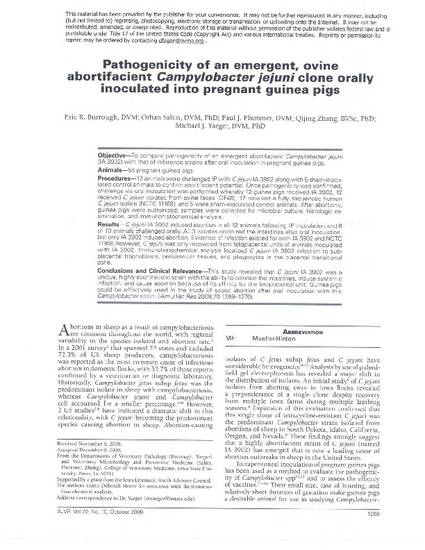
Article
Pathogenicity of an emergent, ovine abortifacient Campylobacter jejuni clone orally inoculated into pregnant guinea pigs
American Journal of Veterinary Research
Document Type
Article
Disciplines
Publication Version
Published Version
Publication Date
10-1-2009
DOI
10.2460/ajvr.70.10.1269
Abstract
Objective—To compare pathogenicity of an emergent abortifacient Campylobacter jejuni (IA 3902) with that of reference strains after oral inoculation in pregnant guinea pigs.
Animals—58 pregnant guinea pigs.
Procedures—12 animals were challenged IP with C jejuni IA 3902 along with 5 sham-inoculated control animals to confirm abortifacient potential. Once pathogenicity was confirmed, challenge via oral inoculation was performed whereby 12 guinea pigs received IA 3902, 12 received C jejuni isolated from ovine feces (OF48), 12 received a fully sequenced human C jejuni isolate (NCTC 11168), and 5 were sham-inoculated control animals. After abortions, guinea pigs were euthanized; samples were collected for microbial culture, histologic examination, and immunohistochemical analysis.
Results—C jejuni IA 3902 induced abortion in all 12 animals following IP inoculation and 6 of 10 animals challenged orally. All 3 isolates colonized the intestines after oral inoculation, but only IA 3902 induced abortion. Evidence of infection existed for both IA 3902 and NCTC 11168; however, C jejuni was only recovered from fetoplacental units of animals inoculated with IA 3902. Immunohistochemical analysis localized C jejuni IA 3902 infection to subplacental trophoblasts, perivascular tissues, and phagocytes in the placental transitional zone.
Conclusions and Clinical Relevance—This study revealed that C jejuni IA 3902 was a unique, highly abortifacient strain with the ability to colonize the intestines, induce systemic infection, and cause abortion because of its affinity for the fetoplacental unit. Guinea pigs could be effectively used in the study of septic abortion after oral inoculation with this Campylobacter strain.
Copyright Owner
American Veterinary Medical Association
Copyright Date
2009
Language
en
File Format
application/pdf
Citation Information
Eric R. Burrough, Orhan Sahin, Paul J. Plummer, Qijing Zhang, et al.. "Pathogenicity of an emergent, ovine abortifacient Campylobacter jejuni clone orally inoculated into pregnant guinea pigs" American Journal of Veterinary Research Vol. 70 Iss. 10 (2009) p. 1269 - 1276 Available at: http://works.bepress.com/paul-plummer/22/

This article is published as Burrough, Eric R., Orhan Sahin, Paul J. Plummer, Qijing Zhang, and Michael J. Yaeger. "Pathogenicity of an emergent, ovine abortifacient Campylobacter jejuni clone orally inoculated into pregnant guinea pigs." American journal of veterinary research 70, no. 10 (2009): 1269-1276. doi: https://doi.org/10.2460/ajvr.70.10.1269. Posted with permission.